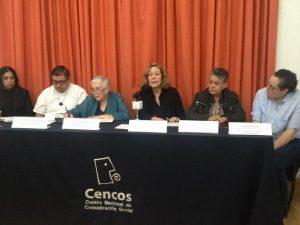US Victims’ and Rights Groups Call to Divert Drug War Aid to Disaster Relief
- Opinión

Members of the U.S. House of Representatives called on Secretary of State Rex Tillerson to “conduct a full review of U.S. assistance to Mexico and push for a comprehensive investigation of flagrant human rights abuses”. The letter, signed by eleven members and led by Reps. Earl Blumenauer (OR), Mark Pocan (WI) and Raúl Grijalva (AZ), asserts that “there is ample evidence that militarization of the fight against drug trafficking has led to an increase in violence and corruption” and states that the U.S.” should assume responsibility for its drug consumption, and focus on treatment and prevention at home, and develop an approach to target cartels’ financial structures.”
The letter was released the day before a devastating earthquake struck central Mexico. The second to hit the country, the earthquake leveled buildings in Mexico City and the states of Morelos, Puebla and Mexico, adding to destruction in the southern Mexico states of Oaxaca and Chiapas. The government estimates that 250,000 people were left homeless and reconstruction costs will be at least $2.5 billion dollars.
Leaders of Mexican human rights and victims’ organizations welcomed the letter and, in the context of the disaster, called for the U.S. government to immediately reassign counter-narcotics aid under the failed drug war to disaster relief. They also demanded the Mexican government cancel millions of dollars in U.S. arms purchases planned by the Peña Nieto administration to fund humanitarian relief.
“This misnamed war on drugs is really a war on Mexican families,” said Maria Herrera, mother of four sons forcibly disappeared and founder of Enlaces Nacionales which groups more than 140 organizations of families of the disappeared in Mexico. “The disappearances, massacres, human rights violations across the board have happened as a result of this so-called war. How long can our governments remain blind, deaf and mute as they have up to now?” Since drug war cooperation began, the Mexican government reports 33,000 disappeared while non-governmental organizations put the number closer to 150,000, including thousands of migrants.
Marta Sanchez, director of the Mesoamerican Migrant Movement, reported how US security aid focused on the U.S. priority of stopping migration has led to massive violation of migrant and refugee rights in Mexico. “This letter from members of the US Congress is important because it shows that at least some are aware of what’s happening and do not agree.” Sanchez added, “We have to migrate, like our migrants migrate, to a better society, and to a budget that addresses security and wellbeing for the population.”
José Filiberto, coordinator of search and rescue brigades organized by Central American migrants after the earthquakes, reported that the migrants who arrive in Mexican communities to help out with little more than their bare hands are breaking the stereotypes of migrants as criminals that are reinforced in the current binational security plans to seal off the borders.
Citing what the Congressional letter refers to as “a US security policy focused exclusively on the war on drugs”, Amaya Ordorika of the Mexican Commission for Defense and Promotion of Human Rights, said the Mexican government purchased $3.5 billion dollars in arms and military equipment from the U.S. between 2012 and 2015, and received $1.6 billion in drug war aid under the Merida Initiative. Her organization has documented hundreds of human rights violations related to “the extreme militarization of public security” under the binational strategy.
Norma Cacho of Pro DESC (Social, Economic and Cultural Rights) offered a contrast between the civilian efforts and armed forces, following their delegation to damaged zones in southern Mexico. “We found high military and federal police presence, with control by military in villages where they were not engaged in humanitarian aid. Civil society has compensated for the lack of aid from the local, state and federal levels, but has also had to confront harassment and in some cases confiscation of donated food.” She noted that the emergency continues, with storms on the heels of the earthquakes, and that those affected demand emergency aid that responds to their needs.
“In the aftermath of the earthquakes, we’ve seen that human security is not more guns and soldiers in the streets, but a society pulling together to address urgent needs like housing, food and water,” said Laura Carlsen of the Mexico City-based CIP Americas Program. “Aid and security budgets should reflect these values and priorities, instead of increasing militarism that benefits the few and has led to so much bloodshed for the many.”
20 October 2017
https://www.americas.org/archives/20288








